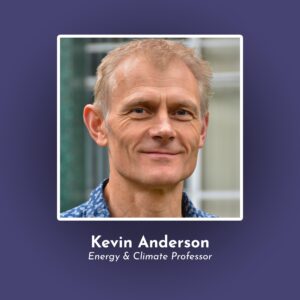
Show Summary
On this episode, Nate is joined by climate scientist Kevin Anderson to discuss the possible paths of averting severe climate outcomes and how this is interconnected with equity. As nations plan their climate goals and coordinate with each other, it’s clear that extreme actions would be needed from everyone to meet the goal of keeping the global average temperature increase below 2ºC – if this is even possible. At the same time, there are wide disparities in the greenhouse gas emissions between the materially wealthiest and poorest within and across countries. How are past inequities already affecting people in presently climate impacted zones? How can concerned individuals begin incorporating changes and communicating with others in their own lives – and is it even worth it to do so? How can we attempt to balance the equity in standards of living and create rapid reductions in emissions, all while grappling with growing geopolitical tensions, declining energy availability, and the multitude of other converging risks in this impending poly-crisis.
About Kevin Anderson
Kevin is professor of Energy and Climate Change at the University of Manchester and visiting professor at the Universities of Uppsala (Sweden) and Bergen (Norway). Formerly he held the position of Zennström professor (in Uppsala) and was director of the Tyndall Centre for Climate Change Research (UK). Kevin engages widely with governments, industry and civil society, and remains research active with publications in Climate policy, Nature and Science. He has a decade’s industrial experience in the petrochemical industry, is a chartered engineer and fellow of the Institution of Mechanical Engineers.
In French, we have a motto that says that a simple drawing is often better than a long explanation. Jean-Marc Jancovici Carbone 4 President
That’s very understandable because with left atmosphere thinking, one of the problems is that you see everything as a series of problems that must have solutions. Iain McGilchrist Neuroscientist and Philosopher
We can’t have hundreds and hundreds of real relationships that are healthy because that requires time and effort and full attention and awareness of being in real relationship and conversation with the other human. Nate Hagens Director of ISEOF
This is the crux of the whole problem. Individual parts of nature are more valuable than the biocomplexity of nature. Thomas Crowther Founder Restor
Show Notes & Links to Learn More
Download transcriptSuggested Reading from Kevin Anderson on inequity reinforcement in the IPCC Working Group III Models: IPCC scenarios project highly unequal future between North and South, Equity Assessment of Global Mitigation Pathways in the IPCC Sixth Assessment Report
00:00 – Kevin Anderson Works + Info, Climate Uncensored
06:43 – 2 consecutive days of record hot temperatures for the last 100,000 years
07:30 – Length and increasing accuracy of global temperature measurements
10:50 – Don’t Look Up
16:45 – Energy consumption reduction after 2008 recession
19:49 – Lucas Chancel and Thomas Piketty
20:18 – 50% of emissions come from 10% of the population
20:30 – The top 1% produce twice as much CO2 as the bottom half
24:32 – Economic models with greater levels of equity tend to be more aligned with climate
24:47 – A majority of fertilizer goes to producing animal feed
27:12 – Emissions have risen by 60% since the first IPCC report
29:58 – Ukraine/Russia War and Effects
30:20 – Global North Debt
30:48 – Complex 6-continent supply chain
32:47 – Roosevelt’s Fireside Chats
36:48 – Likelihood of 1.5 degrees, 2 degrees
36:54 – Peak Oil
38:58 – Planetary Boundaries
41:57 – Every .1 degree is worth fighting for
43:24 – James Hansen, New Paper
47:30 – Carbon Budget
50:17 – Most homes in the US are very poor quality in terms of energy efficiency
52:27 – Carbon Pulse
1:05:08 – Regenerative Agriculture
1:06:40 – Sequestration technologies are in their infancy and are not a guarantee
1:09:50 – Renewables aren’t substituting fossil energy, but adding to total energy currently
1:10:40 – Ecological Economics
1:11:00 – Care Economies
1:12:06 – Economics for the Future – Beyond the Superorganism
1:16:15 – The rise of anti-establishment
1:23:28 – Successful social change has required protesting historically
1:24:12 – Taimur Ahmad TGS Episode
1:26:35 – Emergence







